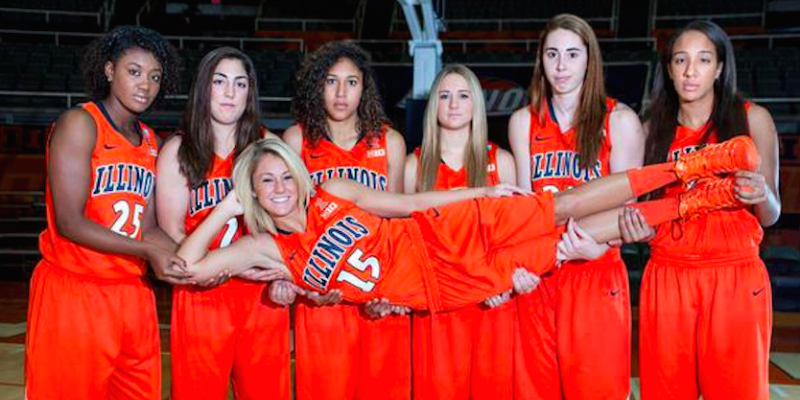On Monday, the Daily Illini broke news of former Illinois women’s basketball players alleging that the Illini staff verbally and emotionally abused players, used racism to divide the team, and, according to one family, forced a player to play through a serious injury. This news was just a splash of water compared to tidal wave Simon Cvijanovic’s claims because A.) the players went about it the right way, sending letters to administration rather than tweeting hostility like buckshot, and B.) women’s basketball is like 50 orders of magnitude less important in our culture than football. Despite this, it’s worth really thinking about what is going on with Illinois athletics.
Both Cvijanovic’s and the women’s basketball players’ claims are similar in that they allege verbal and emotional abuse as well as negligent medical care. The emotional and verbal abuse is something that is important, but not likely to cost anyone their job, I’ll come back to this. The most potentially damning assessment from either group is the charge of inadequate medical care.
The University has promised an independent investigation into the football program and has said that no violations of “applicable law or University policy” have been found among the women’s basketball program but will continue to investigate the medical claims. If the investigation reveals any wrongdoing regarding the athlete’s physical well being, there has to (and likely will) be accountability for football coach Tim Beckman, for women’s basketball coach Matt Bollant, even for athletic director Mike Thomas.
It would be an utter shock, however, if any of those individuals at the top were to be held accountable for verbally and emotionally abusing players because that is simply how coaches operate. One individual already has been punished: assistant coach Mike Divilbiss was let go just a short time before the allegations against him and Bollant were made public. He was specifically noted as one who would verbally abuse players, so it seems to be no coincidence that, despite the university’s language about “applicable law,” he was given the axe. Perhaps an assistant on Beckman’s staff will be given the same treatment after the investigation into the football team is included. But will Beckman actually be held accountable? Seems unlikely.
This is because the only difference between Beckman and College Football Playoff-winning coach Urban Meyer or Bollant and all-time winningest women’s basketball coach Geno Auriemma, at the most basic level, is wins. In four seasons at Illinois, Beckman is 12-25; over three seasons, Bollant is 43-51. If either coach had numbers closer to Meyer or Auriemma, I doubt players would be speaking out. I’d even wager that the emotional and verbal abuse inflicted upon the Illini has an analogue in Ohio State football or UConn basketball (Meyer and Auriemma’s respective programs).
When I was in college I earned my coaching certification from both the IHSA and the American Sport Education Program. I had to pass a pair of tests in order to receive the certification, and, naturally, the class I took was centered around those tests. In that class we learned that there are only a few types of coaches: the “Bobby Knight” yell-and-curse style, the too-permisive friend-of-the-player style, and the ideal combination of the two that has authoritative sway over the team. I don’t feel that this definition of every coach’s demeanor is entirely right, but I think in most cases it is. And I think many top-level coaches come down closer to the “Bobby Knight” style than athletes or parents of athletes would want.
When Tim Beckman looks out at his roster of 105 players and thinks about the best way to assert his dominance, calling a few players names and singling out the injured with purple jerseys seems like the path of least resistance. Even though Bollant’s roster is much smaller, calling girls who don’t start games “dogs” and forcing them to participate in extra practices is an easy motivation technique.
There may be similar things said and done on college teams across the nation, but unless it’s backed up by winning perhaps the players decide the whole thing wasn’t worth it. Of course, only one team out of 127 wins the College Football Playoff and a scant 1.6% of college football players go on to have a pro career, so speaking out after the facts may be a case of sour grapes at a dream that has died. Maybe, however, it is also a way to warn others the “culture” the coach is selling them is a facade and that his words and actions do not line up.
College athletes are finally having their moment, rebelling against universities and the NCAA for treating them like serfs and categorically denying their rights by using the simple phrase “student-athlete” rather than “employee” to describe them. I believe in the right to due process, and presume that Beckman and Bollant are innocent regarding the athlete’s physical health until proven guilty. However, as more athletes speak out against bullying and otherwise emotionally abusive coaches, our culture, which is much less permissive of those behaviors than it was just 20 years ago, will start to stand with the athletes and coaches will begin to pay the price. If this happens, although they may never be acknowledged as employees, athletes will at least earn the right to perform their task under the same atmosphere that any employee would — free from harassment from a superior. If Chancellor Phyllis Wise wants to prove how valuable students are to her and how progressive the University of Illinois is, she could start by removing the individuals accused of abuse.
Since no one seems to want to even answer questions about this, it seems very unlikely, though.








